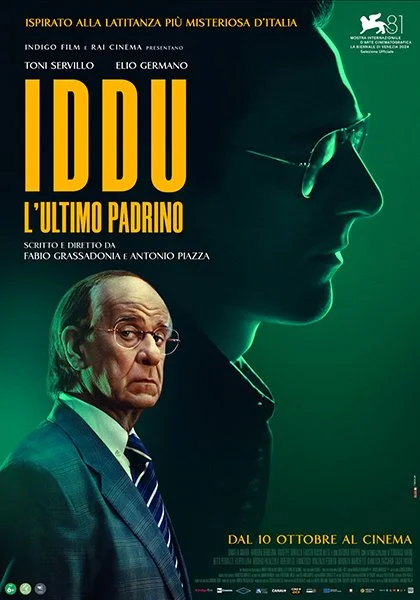Returning for a fifth year, CinemaItaliaUK's Donne di Mafia mini festival twins Pasquale Scimeca's The Judge and the Mafia Boss (Il giudice e il boss) with Fabio Grassadonia and Antonio Piazza's Sicilian Letters (Iddu). And it's the latter they have been kind enough to share.
Chosen by his father to be his successor after he had the guts to slaughter a goat as a child, Matteo (Elio Germano) becomes head of a Sicilian Cosa Nostra family after the death of Don Gaetano (Rosario Palazzolo). This coincides with the release from prison of his old friend, CatelloPolumbo (Toni Servillo), a disgraced headmaster and mayor who is appalled to find wife Elvira (Betti Pedrazzi) living in a cramped apartment with daughter Letizia (Dalila Reas), who is pregnant by doltish janitor's son, Pino (Giuseppe Tantillo).
When Catello attends the funeral, he is brought in for questioning by police colonel Emilio Schiavon (Fausto Russi Alessi) and his brusque sidekick, Inspector Rita Mancuso (Daniela Marra), who has no truck with crime families and the latitude they receive from the local authorities. They want Catello to enter into acorrespondence with Matteo so they can lure him into the open and suggest using a hotel project that has fallen into abeyance during Catello's incarceration as bait. They insist he uses the traditional form of `pizzini' (tightly folded and taped missives that are smuggled by hand between recipients) and Catello is surprised when Matteo (who is his godson) responds, through a letter typed by Lucia (Barbora Bobulova), the blackmailed widow with whom he is laying low.
Using his contacts with Matteo's older brother, Giovannino(Filippo Luna), Catello wins the approval of their uncompromising sister, Stefania (Antonia Truppo), who is intrigued by the hotel as a means of boosting the family's dwindling resources (as being on the run isn't cheap). However, the town council is against Catello's involvement because he has a criminal record and it bothers him that Rita has such a jaundiced view of him, even though she realises that the grieving Matteo sees Catello as a father figure and trusts him because of their shared love of literature.
As Matteo had a habit of disobeying his father and getting involved with unsuitable girls, Catello writes that he had always sympathised with his plight as the heir in waiting. But Rita is getting impatient and Schiavon has to remind her that she has already blown one operation against Matteo and Stefania. She confides in Catello that she thinks her boss is actually protecting Matteo and that this mission is an elaborate front to seem proactive. This scares him because he worries that Matteo will learn of his involvement. But Rita promises to protect him if he does things her way and exploit Matteo's estranged son as his weak spot. However, Stefania is also protective towards the boy and she is outraged when a teacher gives him homework on Father's Day. As Pino has played her a recording of the mayor being rude about her (which costs him his job), she asks him to get Catello to send the boy's essay in his next pizzini.
Meanwhile, cooped up in a single room, Matteo is also getting twitchy, especially when the jigsaw he has been doing is missing its final piece and Lucia's neighbour bangs a hole through an adjoining wall because he wants a window. In order to exact his revenge, he sneaks out with Lucia to burn down the man's vineyard during the night and they admit to having enjoyed their illicit excursion.
Much to Catello's dismay, Matteo agrees to meet his son in the dunes and an ambulance collects the old man and the boy from the rendezvous. Rita follows at a distance and watches as Catello has a heart attack and the frightened kid wanders away in the direction of the same goat bleating that Matteo has heard from his hiding place in the reeds. They find the animal trapped in a hole, but by the time Rita reaches the scene, Matteo has gone and she only finds the child cradling the goat.
Schiavon reprimands Rita for disobeying orders, but arrests Giovannino and Stefania to make it look like the police are on the case. He also lets Matteo know that Catello had betrayed him and he exacts his revenge by having Pino tossed into the sea. From a room with the shadows of barred windows on the wall, Matteo also sends a final pizzini, in which he informs Catello that he will punish him by letting him live, with his family disowning him, the hotel demolished, and the townsfolk knowing he's a traitor. As the film ends, Lucia places the final piece in the jigsaw and has coffee with Schiavon, while the prized statue of Ephibus of Salinunte (or `u pupu') in the local museum has been replaced by a replica of Matteo.
While not of the same standard as Salvo (2013) or Sicilian Ghost Story (2017), this is a satisfyingly complex third feature from Fabio Grassadonia and Antonio Piazza. Based on the case of Matteo Messina Denaro (who was apprehended after a 30-year search in 2023), the action is slightly hamstrung by the need to show the pizzini being written and read (although letter-writing is massively more cinematic than text-messaging). But the co-directors impose a cautious pace that reflects the suspicions and fears of the correspondents and the growing suspense, as Rita becomes increasingly impatient at playing a waiting game.
Despite being saddled with some clichéd dialogue, Daniela Marra is bristlingly intense as the cop on a mission and her brooding contrasts with the simmering fury of Antonia Truppo's Stefania, the weary contempt of Antonia Truppo's Elvira, and the couched resentment of BarboraBobulova's Lucia. Whether flashing back to encounters from his past or pondering the worthwhileness of his existence, Elio Germano gives Matteo an aura of melancholic menace that couldn't be more different from Catello's muddled scheming. With his hilarious comb-over, Catello proves a figure of fun from the moment a pigeon poops on his lapel as he leaves prison. But he has a disconcerting capacity for ruining other people's lives with a lack of self-awareness that belies his supposed intellect. He's brilliantly played by Toni Servillo, but when did we expect anything less?
Shooting on home turf, Grassadonia reveals a sure sense of place with cinematographer Luca Bigazzi, who also makes evocative use of dimmed light to reinforce the sense of confinement and incapacity conveyed by Gaspare De Pascali's sets. Editor Paola Freddi also weaves together the plot strands without loosening the grip of the cat-and-mouse game that is drolly counterpointed by Lorenzo `Colapesce' Urciullo's score. Yet, this never quite sustains the wit and intrigue of the early response to the line from Ecclesiastes line about evil under the sun: `And we have so much sun here in Sicily.'

